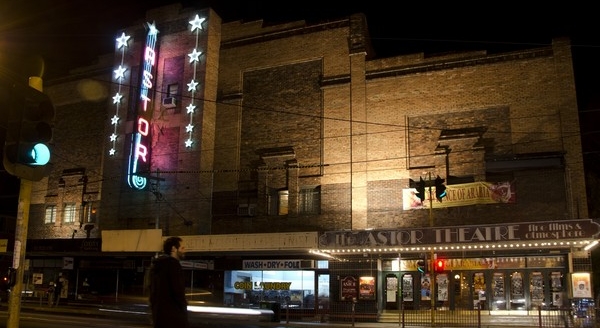Long before he took over The Astor, Florence was “around the cinema environment”. In the ’60s and ’70s Florence’s uncle ran a series of about 15 Greek movie theatres in Melbourne, including The Astor Theatre (the only cinema for which his uncle didn’t own the freehold). With the Greek language cinema business waning due to the establishment of SBS and the emergence of the video market, The Astor Theatre shut its doors in early 1982.
When his father suggested he take up the leasehold on the property, Florence leapt at the chance. “I rang the owner, and went and had a look, and it was like walking into an Aladdin’s cave,” Florence recalls. “It was very derelict, but magical in its scope and style – especially the oval opening, which really caught my eye.”
In September 1982 the modern incarnation of The Astor opened its doors for the first time. “The first film we ever showed was King Kong, the original 1933 version,” Florence says. “We also had a live performance that night from a group from La Trobe Uni called the African Drums, which did an African musical ensemble on stage, which my brother was part of.”
The Astor Theatre business grew slowly, and Florence and his brother – who ran the business with George at the time – staged various rock concerts at the venue “out of financial necessity”. Between 1982 and 1985, The Astor hosted concerts by high profile acts such as Midnight Oil, INXS, Men at Work, Lene Lovitch and Siouxsie and the Banshees. “The Astor was like the middle ground between a pub arena and a big arena,” Florence says.
By the late ’80s The Astor’s cinematic fixtures were being gradually replaced, with a new, larger screen being installed. The Astor’s program reflected Florence’s deep understanding of film, past and present, and his sense of cinematic occasion. “We’ve always had a limited number of sessions every week because I think that each screening should be a special occasion, and I think that works very well because most sessions we’re guaranteed to have a large audience.”
Over the years The Astor has screened classic films from the Marx Brothers to the Blues Brothers, from A Day at the Races to Apocalypse Now, from Metropolis to Star Wars, from Dr Zhivago to Reservoir Dogs, augmented by the latest releases of the day. Florence cites the appearance at the cinema of cast members from his favourite film, Stanley Kubrick’s 1968 masterpiece 2001: A Space Odyssey as a personal highlight. “We had Keir Dullea and Gary Lockwood [who played Dave Bowman and Frank Porter in the film] – we’ve had them now three times. That’s something you never think would happen, and to meet these people face to face was quite special”. Befitting its reputation as a haven for cinephiles, The Astor even ran the Melbourne International Film Festival between 1985 and 1993. In later years, The Astor also hosted various university student film festivals, as well as hosting a range of private functions.
Beyond the films that he’s screened at The Astor, Florence cites the “inter-generational connection” that’s grown up around the cinema. “You have couples who’ve met for the first time at The Astor, and then they bring their children along to The Astor and they have an incredible time, and then they grow up and become an Astor fan,” Florence says. “Or you get a situation where the grandparents bring their grandchildren along to see a Charlie Chaplin film from ’30s or a Harold Lloyd film from the ’20s, and they’re both laughing at the same jokes, having the same experience as the grandfather did in 1924.”
Despite weathering the storm of movie piracy and online streaming (“I don’t feel we have any competition from pirating, or any other mode of viewing at all,” Florence says), The Astor met its match in the form of recalcitrant landlords. In April last year, it was announced that The Astor Theatre business would cease showing films in 2015. With Florence and his current landlord at loggerheads over an extensive list of issues, the landlord decided not to renew The Astor’s lease on the property.
Florence remains bitter at the turn of events, and the failure of his current and previous landlord to appreciate the cultural importance of The Astor. “Even before the current landlord, the landlord saw it as a potential development – which was only stopped because the building had been heritage listed,” Florence says. A promise by the present landlord of a not-for-profit trust that would control both the building and the business fell through and, Florence says, “it became a very hostile commercial relationship”.
Florence remains hopeful that his current 11th hour negotiations may allow a new tenant to come into the building and continue its cinematic tradition. In the meantime, Florence is concentrating on the running the program for the last week of his own tenure at The Astor, which will culminate with screenings of 2001: A Space Odyssey in all its original 70mm glory. “The technology is a very important part of what we do,” Florence says. “It’s an experience you just cannot have in any other type of cinema.”
BY PATRICK EMERY

